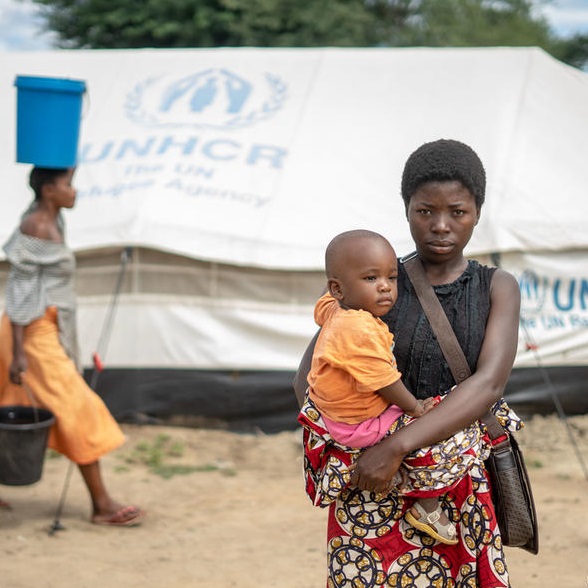Joint Assessment of Refugees from Burundi in Lusenda and Mulongwe Refugee Camps – Jan 2021
Congo (Democratic Republic of the), 2021
Get MicrodataIdentification
UNHCR_WFP_COD_2021_JAM_Burundi_v2.1
Joint Assessment of Refugees from Burundi in Lusenda and Mulongwe Refugee Camps – Jan 2021
| Name | Country code |
|---|---|
| Congo, Dem. Rep. | COD |
Other Household Survey [hh/oth]
In January 2021, the United Nations High Commissioner for Refugees (UNHCR) and the World Food Programme (WFP) undertook an assessment of refugees from Burundi in the Lusenda and Mulongwe refugee camps in South Kivu, Democratic Republic of the Congo (DRC). The objective of the assessment was to assess the relevance of UNHCR and WFP's targeting in the context of Burundian refugees and possibly develop a targeting strategy harmonized as much as possible with other refugee populations in DRC.
A secondary objective was to introduce barcodes linked to unique identifiers used in registration. This vulnerability assessment was conducted through an exhaustive inventory of all refugee households living in the Lusenda and Mulongwe camps (South Kivu) as well as those living outside the camps and who went to the interview locations in the camps. The survey targeted Burundian refugee households assisted by WFP and UNHCR. The data collected during the survey are quantitative and were supplemented by qualitative data collected in February 2021 in the camps of Lusenda and Mulongwe through four focus group discussions per camp for a total of eight focus groups. All refugee households in Lusenda and Mulongwe camps as well as those living outside the camp, were interviewed with a core set of questions (see variable TypeEnquete, response Ciblage). In addition, 7% of households, randomly selected, participated in a more detailed interview (see variable TypeEnquete, response Exhaustive). A total of 7,873 households were selected.
This dataset represents an anonymous version of the original dataset. A sample of the original dataset was drawn as part of the anonymization. The sample was stratified by camp (Lusenda or Muolongwe) and the type of survey (Ciblage or Exhaustive). All respondents that were part of the Exhaustive survey were preserved, while a random sample of the respondents that were part of the Ciblage survey was taken. The variable strata defines which records correspond with which group, and survey_weight provide the final weights.
Sample survey data [ssd]
Households
Version
v2.1: Edited, cleaned and anonymised data.
2022-10-01
Scope
The scope includes:
- household demographics
- food production
- food security and nutrition
- health
- income, expenditures and debt
- living conditions
- protection
- water and sanitation
- feedback on humanitarian assistance
| Topic |
|---|
| Health and Nutrition |
| Health |
| Protection |
| Food security |
| Livelihood and Social cohesion |
| Shelter/Other Infrastructure |
| Income Generation |
| Water Sanitation Hygiene |
| Crop Production |
Coverage
Lusenda and Mulongwe refugee camps in South Kivu.
Refugees from Burundi living in Lusenda and Mulongwe refugee camps in South Kivu
Producers and sponsors
| Name |
|---|
| UNHCR |
| WFP |
Sampling
The original dataset was a full enumeration for a core set of questions related to demographics, livelihoods and assets (TypeEnquete ciblage). A random sample of households were selected to answer an additional set of supplementary questions relating to their livelihoods, food consumption and coping strategies (TypeEnquete exhaustive). The anonymous data published on the Microdata Library is a stratified random sample of the original dataset. Data is stratified by by site (Lusenda and Mulongwe) and further more into the group of households that was asked only the base questions (ciblage) and the group of households that was asked the base questions and additional supplementary questions (exhaustive).
Sample weights (survey_weight) were calculated using the inverse probability of selection, i.e. the size of the sample frame (N) divided by the sample size (n). Weights were calculated for each strata (strata).
Data collection
| Start | End |
|---|---|
| 2021-01-01 | 2021-01-31 |
| Name |
|---|
| UNHCR |
| WFP |
Data Access
UNHCR, WFP (2022). Congo, Dem. Rep.: Joint Assessment of Refugees from Burundi in Lusenda and Mulongwe Refugee Camps – Jan 2021. Accessed from: https://microdata.unhcr.org
Contacts
| Name | Affiliation | |
|---|---|---|
| UNHCR Global Data Service Statistics and Demographics Section | UNHCR | microdata@unhcr.org |
Metadata production
UNHCR_WFP_COD_2021_JAM_Burundi_v2.1
| Name |
|---|
| UNHCR |
2022-08-22
